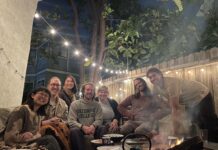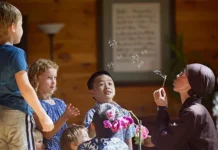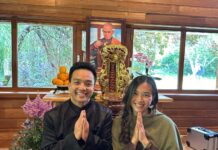by Members of the European Wake Up Sangha
Thay believed that Buddhism had much to contribute to real social change. He said he would find ways to support me in a movement for social change according to the Buddhist spirit. He would help bring together many good hearts who wanted to work together. He agreed to write articles about this in national magazines and then start several pioneering development villages to show that social change could be based on love, commitment, and responsibility. Eventually we could start a training center for workers in education, agriculture, and health care, who would then go all over the country.
— Sister Chan Khong, Learning True Love: How I Learned and Practiced Social Change in Vietnam
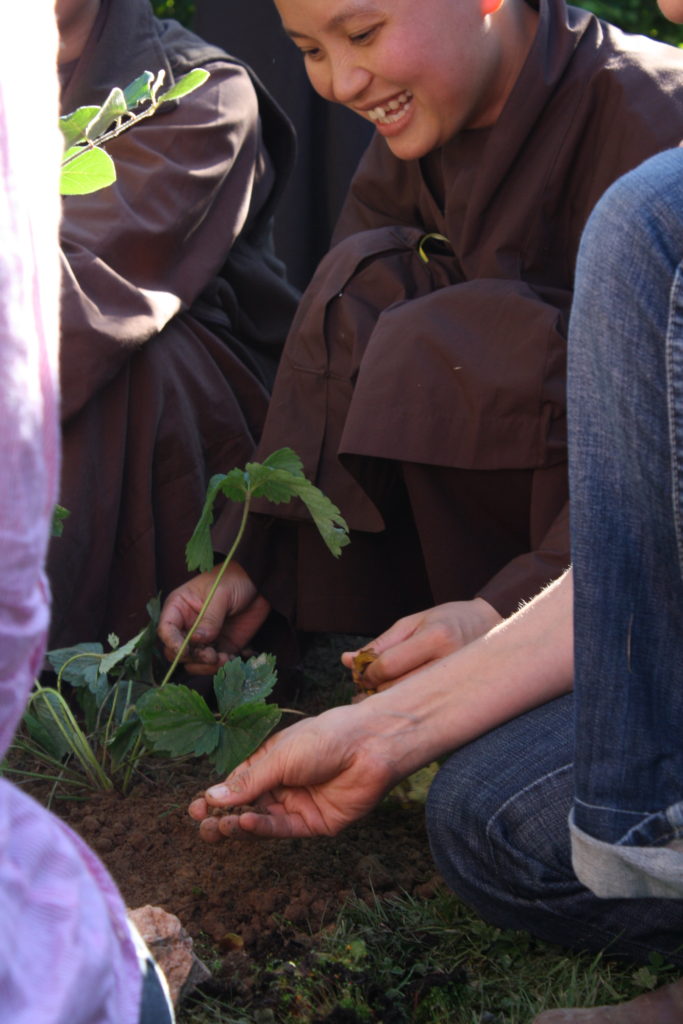 For a long time the vision to organize a Wake Up Vietnam Tour had been nourished by many conditions. Many of us shared a collective aspiration to connect to our spiritual home and ancestors, to practice as a Sangha on a journey, and to get in touch with perspectives and living conditions different from the Eurocentric way of looking and living. Reading Fragrant Palm Leaves by Thay and Learning True Love by Sister Chan Khong touched a strong and inspiring source within us. All these elements gave us the energy to cultivate the conditions for the realization of this vision.
For a long time the vision to organize a Wake Up Vietnam Tour had been nourished by many conditions. Many of us shared a collective aspiration to connect to our spiritual home and ancestors, to practice as a Sangha on a journey, and to get in touch with perspectives and living conditions different from the Eurocentric way of looking and living. Reading Fragrant Palm Leaves by Thay and Learning True Love by Sister Chan Khong touched a strong and inspiring source within us. All these elements gave us the energy to cultivate the conditions for the realization of this vision.
In August 2011, all the conditions came together, and a group of ten young people from Chile, Belgium, England, Germany, and Holland gathered at the European Institute of Applied Buddhism for a one-week retreat, preparing for a three-and-a-half week journey in Vietnam. We realized that going to Vietnam was essential to deepen our aspirations and our practice, and that to be in touch with the roots of Wake Up, we had to be in touch with Vietnam.
Nourishing Our Roots
Hopefully, the green kindergarten will strengthen the bonds within the local community, become a model for other rural areas in Vietnam, and contribute to a collective environmental awareness.
In Saigon, morning has broken. The sky is blue, the sun is shining. We are sitting joyfully in a bus on our way to Phap Van Monastery, the former School of Youth for Social Service (SYSS), which was founded by Thay in the early 1960s. The School of Youth for Social Service was a grassroots relief organization that rebuilt bombed villages, set up schools and medical centers, resettled homeless families, and organized agricultural cooperatives. Rallying some 10,000 student volunteers, the SYSS based its work on the Buddhist principles of nonviolence and compassionate action. The present-day continuation of the SYSS is known as the Love and Understanding Program.
Arriving at Phap Van, we enter the meditation hall and are warmly welcomed by a monk and members of the first generation of the SYSS, who have been practicing and engaged in social service in rural areas for more than forty years. Together we enjoy sitting meditation and touching the earth to honour our blood and spiritual ancestors, followed by a sharing on engaged Buddhism, the history of the SYSS, spiritual practice, and our aspirations.
During this session the question is asked, “How can we continue the SYSS?” One of the social workers smiles and answers, “This is very easy. Only by asking yourself this question, you are already beginning to continue the SYSS.”
Leaving the meditation hall, we walk slowly and silently towards the garden in the centre of Phap Van, where there is a memorial to Sister Nhat Chi Mai—one of the first members of the Order of Interbeing who burned herself in Saigon on May 16, 1967, as an act of protest against the Vietnam War—and to the monastic and lay SYSS workers who died during their service. One of the social workers starts digging a hole for the collective tree-planting ceremony, and each of us contributes by filling the hole with soil and watering the tree. Our first Wake Up tree in Vietnam has been planted, and in this happy moment, we are aware of our spiritual roots and of our aspiration to nourish this tree of understanding and compassion and to continue the beautiful work of the SYSS.
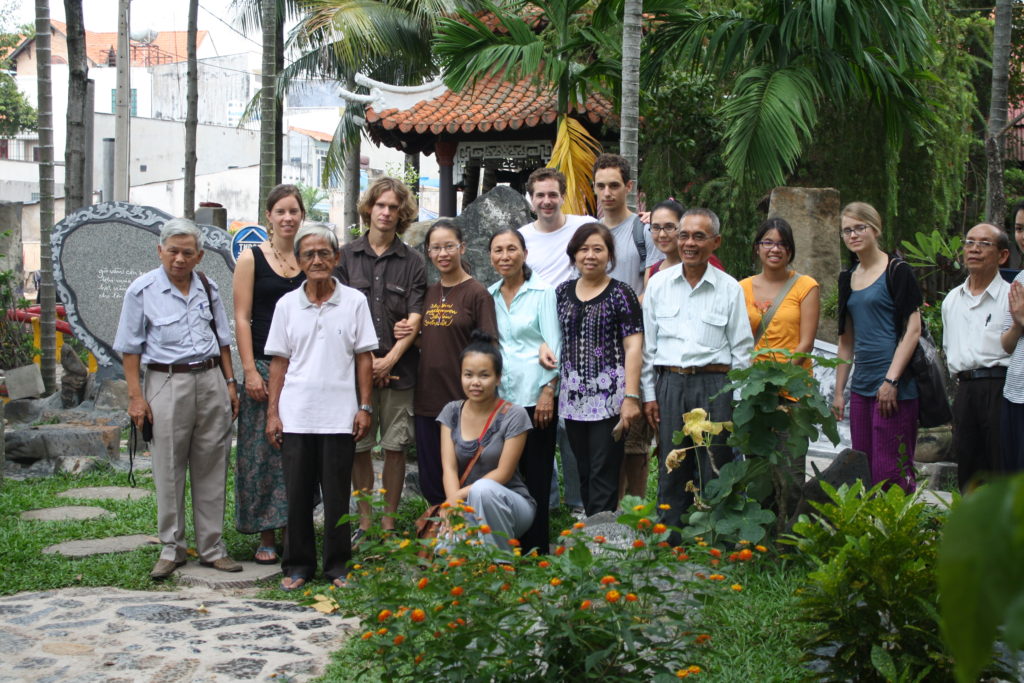 The Seedling Project
The Seedling Project
On our journey through South, Central, and North Vietnam, we continued to be nourished by the joy of being in touch with monastics, social workers, youth Sanghas, children who are supported by the Love and Understanding Program, and many other beautiful human beings. All these inspiring encounters and conditions gave rise to the development of a collective vision for establishing a green kindergarten in Vietnam. We started calling our vision “the Seedling Project” and imagining it in terms of its social, educational, environmental, and empowerment dimensions.
I. Social
In remote areas, the struggle for a better life leaves people with little time and energy to care about education or cultural and spiritual development. Our aspiration is to build a hybrid space for poor families that will benefit children as well as parents: during the day it will function as a home where children can take refuge, make friends, play, and rest while their parents work, while being provided with healthy nutriments and pre-school education based on mindfulness. In the evenings and on weekends, the space will be a meeting place where teachers and parents can exchange ideas and learn from one another.
II. Education
Teachers in this green kindergarten will be trained in the practice of mindfulness in daily life, healthy consumption, and the cultivation of environmental awareness and ecological practices such as solar cooking, rainwater collection, and organic gardening. The teachers will find ways to integrate mindfulness into the children’s daily activities. Together they will take time to enjoy being in nature and observing natural phenomena. Children will be given opportunities and tools to express themselves artistically through painting, drawing, molding, and tinkering with natural and recycled materials.
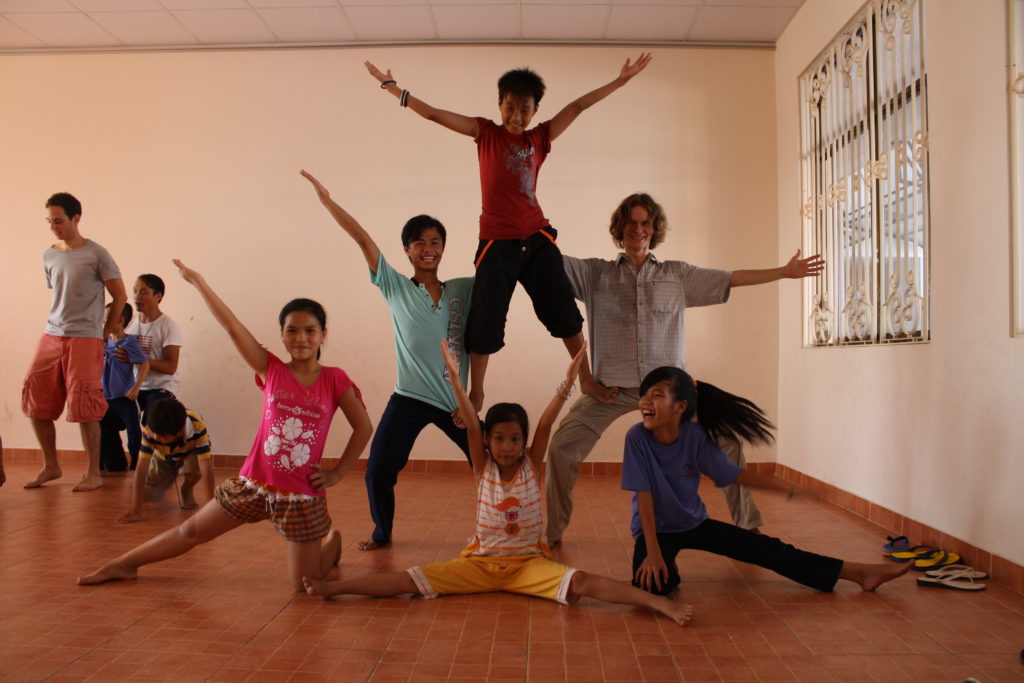 III. Architecture and Environment
III. Architecture and Environment
The kindergarten building will be harmoniously integrated into the natural and cultural environment of the local people. The architectural construction will be simple and economical, ecological and sustainable; it will utilize local know-how and materials and will weave tradition with contemporariness. Renewable energy technologies, such as solar cells, rainwater harvesting, geothermal power systems, greywater treatment plants, and compost toilets, will be introduced, and a permaculture garden with trees, flowers, fruits, and vegetables will be cultivated.
IV. Empowerment
We aspire to provide a space of help through self-help, where local people feel inspired to share knowledge with one another, cultivate awareness, and develop skills. This involves engaging local people in the building process, raising their understanding about the value of natural and cultural resources, training them in ecological practices for daily life, and thus enabling them to transmit their knowledge and skills to their children and other people. Hopefully, the green kindergarten will strengthen the bonds within the local community, become a model for other rural areas in Vietnam, and contribute to a collective environmental awareness.
We consider the project to be a great opportunity for mutual understanding, learning, and growth for both the project team members and the local people. We do not view ourselves as people from the West who are coming to help the poor, incapable people of Vietnam. We aspire to transform the superiority, inferiority, and equality complexes that may lie deep in our store consciousness, as well as the notion of a separate subject and object.
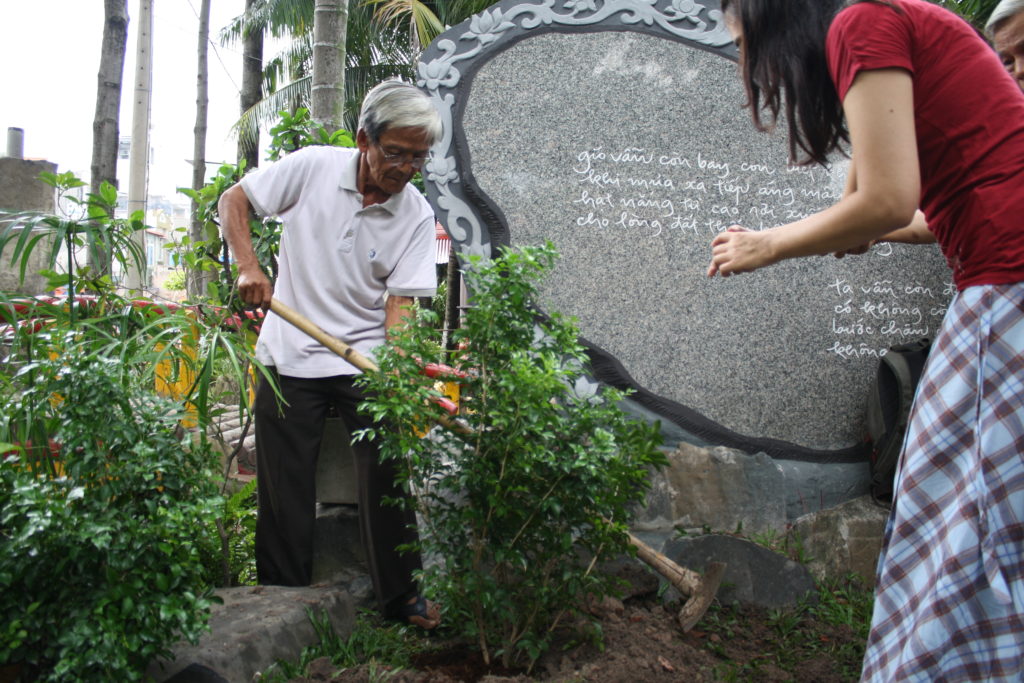 Favourable Conditions
Favourable Conditions
After presenting this project to Sister Chan Khong and the monastic and lay Sanghas during the Applied Ethics Retreat in Plum Village at the beginning of 2012, we have received much positive feedback. We have raised a great amount of money for this project and have been offered possible sites in Vietnam for the construction of the kindergarten. Many friends with diverse backgrounds and specialized skills have offered support.
We are in the process of making connections with people, organizations, and places in Vietnam and finding ways to establish fruitful cooperation between Europeans and Vietnamese who wish to be involved in the project. We are adopting and combining a variety of approaches—traditional and contemporary, local and global. A member of the project team will soon travel to Indonesia, where she will visit the Green School in Bali, and to Vietnam, where she will visit the various sites that have been proposed for the kindergarten. She will also meet with SYSS workers to continue the dialogue between the SYSS and Wake Up. Meanwhile, our team in Europe is developing a website to present the Seedling Project to a wider audience and to be a platform for the exchange of aspirations, ideas, and know-how.
Clearing Our Streams
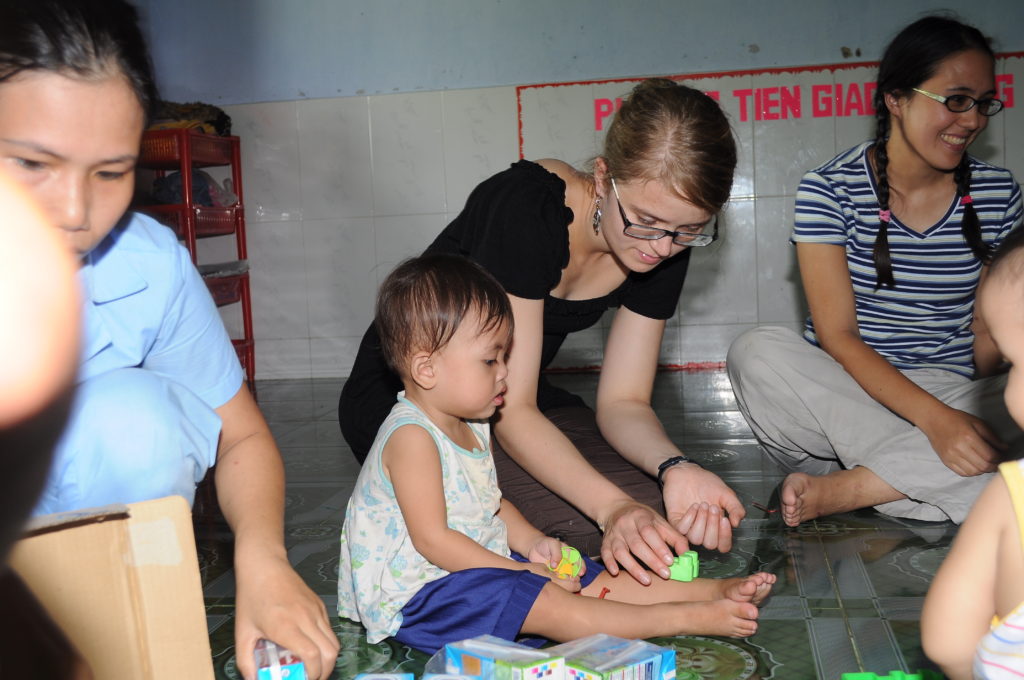 In Hue, the sky is still blue and the sun is still shining. It is our last day in Central Vietnam. With ten mango trees and ten pomelo trees in the trunk of our car, we are setting out for a kindergarten built by the Love and Understanding Program. When we arrive in the classroom, we find the children sitting in a circle, singing Plum Village songs to us. Their voices are sweet as mangos, refreshing as pomelos. The whole afternoon is dedicated to playing and singing with children from three different classes and to sharing milk and biscuits with them.
In Hue, the sky is still blue and the sun is still shining. It is our last day in Central Vietnam. With ten mango trees and ten pomelo trees in the trunk of our car, we are setting out for a kindergarten built by the Love and Understanding Program. When we arrive in the classroom, we find the children sitting in a circle, singing Plum Village songs to us. Their voices are sweet as mangos, refreshing as pomelos. The whole afternoon is dedicated to playing and singing with children from three different classes and to sharing milk and biscuits with them.
After we enjoy dinner in silence at the kindergarten with Uncle Dinh, the director of the Love and Understanding Program in Hue, and other social workers, an intimate sharing evolves. “How can you keep your deepest aspiration alive?” one of our brothers asks. Uncle Dinh replies, “By understanding and transforming your own suffering. If you are not capable of taking care of yourself, you will not be able to help others.”
Twenty holes have already been dug, and together with our uncles we lower the young trees into the ground. Planting trees with the intention of nourishing our roots and clearing our streams, hope to make the world greener, both literally and figuratively, by sowing seeds of brotherhood and sisterhood, understanding and love, joy and happiness, and by sharing our time and material resources with those in need. May there be mangos and pomelos for past, present, and future generations, starting with the cultivation of a small seedling.
This is a compilation of sharings by members of the European Wake Up Sangha who were part of the Wake Up Vietnam Tour.
Reprinted with permission from The Mindfulness Bell

